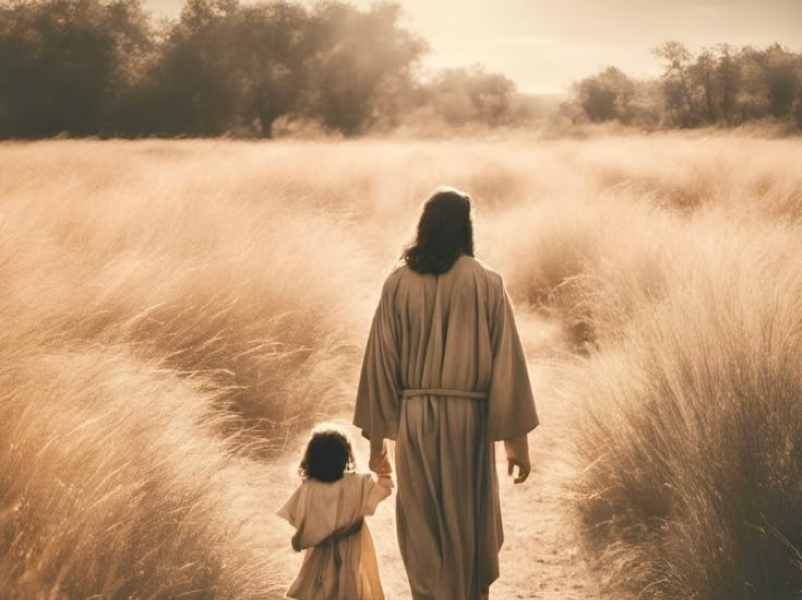BE A CHILD FOR GOD

TEXT: ESTHER 2:10-11, Esther 4:16
ESTHER 2:10-11 – Esther had not revealed her people or family, for Mordecai had charged her not to reveal it. 11 And every day Mordecai paced in front of the court of the women’s quarters, to learn of Esther’s welfare and what was happening to her.
Esther 4:16 – “Go, gather all the Jews who are present in Shushan, and fast for me; neither eat nor drink for three days, night or day. My maids and I will fast likewise. And so I will go to the king, which is against the law; and if I perish, I perish!
In a world where men are eager to mature swiftly, become self-sufficient, and seek independence above all else, the Bible calls us to approach God with the trust and humility of a child. Jesus Himself emphasises the necessity of becoming like little children to enter the Kingdom of Heaven (Matthew 18:3). But what does it truly mean to be a child before God? How do the concepts of childlike faith, trust, and obedience shape our relationship with the Lord? To gain a more profound understanding, we can turn to the insights within the Scriptures.
Matthew 18:3 – and said, “Assuredly, I say to you, unless you are converted and become as little children, you will by no means enter the kingdom of heaven”.
I recall, many years ago, when the Lord spoke to me, urging me to be a child for Him. Those words struck me as surprising yet filled me with curiosity about their true meaning. I immediately began to study what it meant to embody the innocence of a child, especially as I observed the lives of my nephews and nieces. I would venture to say that in this present time, God is seeking children—rather than adults—to fulfil His purposes for His glory. I pray that, as we reflect on the qualities of a child, you may find yourself among those He desires to use.
A child’s developmental journey begins even before birth. From weeks 16 to 22, science demonstrates that a baby starts to hear sounds, and by the third trimester, a baby can recognise the voice of their mother. This developmental process reflects the trust and dependency inherent in a child’s nature—qualities God invites us to embrace in our walk with Him.
The story of Esther is a remarkable example of courage, obedience, humility, and unwavering faith. Despite her beauty and royal position, Esther demonstrated profound obedience and humility in following the guidance of her guardian, Mordecai. Her story illustrates the essence of trusting God amid uncertainty. To be a child for God to use is to walk with Him in complete dependence and trust, just as a child instinctively follows their parents. There is something uniquely vital about childlike faith that even Jesus points to in Matthew 18:3, where He tells us that to enter the Kingdom of Heaven, we must become like little children.

Walking with God requires the embrace of this childlike faith—one that is not self-reliant but fully God-reliant. Children do not question the trustworthiness of their parents or carers; they trust them implicitly. Likewise, as we walk with God, we are called to place our full trust in Him, confident in His goodness, faithfulness, and reliability in every circumstance.
Just as a child cannot walk without the guidance and support of their parents, we, too, cannot walk with God unless we follow Him in obedience and humility. Esther’s example shows us that walking with God requires attentiveness to His call, even when the path is uncertain or challenging. She trusted God and chose to walk in obedience, even when the road ahead appeared daunting.
In Esther 4:14-18, we witness her bold decision to risk her life to save the Jewish people. Mordecai urged her to act, reminding her that she might have been placed in her royal position “for such a time as this” (Esther 4:14). Esther responded by asking the people to fast and pray for three days, seeking God’s will before acting. She embraced her role as a servant of God’s plan, trusting that He would guide her through the challenges ahead. Her childlike trust and obedience offer a powerful example of how we, too, can walk with God—entrusting our lives to Him and seeking His direction at every step.
Obedience is another essential aspect of being a child for God, and it cannot be overstated. A child naturally follows the guidance of their parents, even when they do not fully understand the reasons behind their instructions. They trust that their parents know what is best for them. Similarly, in our walk with God, we must obey His Word and trust that He knows what is best for our lives. Even when we do not understand His timing or the reasons behind His ways, we follow in faith, knowing that God is leading us toward His greater purpose.
In Esther’s life, her obedience to God’s calling and Mordecai’s guidance opened the door for her to save her people. Her decision to risk her life for the sake of others was an act of obedience born out of deep trust in God’s sovereign plan. Just as Esther was made for “such a time as this,” so too have you been uniquely placed to stand and align with God’s purpose and plan for your life.
As we reflect on this, here are three critical questions to consider:
-
Am I fully trusting in God’s plan for my life, even when I don’t understand the path ahead?
-
Do I take the time to listen for God’s voice in my life, and am I responsive to His leading?
-
Am I willing to obey God’s commands, even when it requires stepping out in faith or facing challenges?
PRAYER:
Heavenly Father, I ask that You help me overcome my fears as I choose to depend on You completely. Realign my focus to who You are in my life. I ask this with a sincere heart in Jesus’ name, Amen.

HOPE AGAINST HOPE (PART 2): THE.
TEXT: John 5:1-9 (NKJV) [1] Afterward Jesus returned to Jerusalem for one of the Jewish holy.
Read More
HOPE AGAINST HOPE (PART 1): THE.
Text: Romans 4:18-22 (NKJV) 18. who, contrary to hope, in hope believed, so that he became.
Read More


1 Comment
This has resonated with me quite deep! Thank you for this word❤️❤️